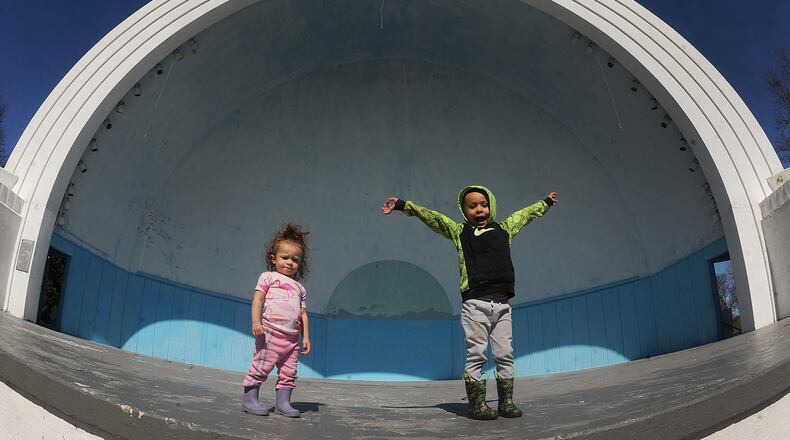“We’re committed to taking care of what we have and we’re trying to be responsible stewards of taxpayer dollars,” said Bill Tschirhart, Five Rivers MetroParks’ chief of administration. “We know people love the parks and getting out in them. We want to make these investments for future generations.”
Credit: Tom Gilliam
Credit: Tom Gilliam
Five Rivers MetroParks staff have been doing financial modeling to evaluate a potential tax levy of 0.6 mills or 1 mill, officials said.
A 1-mill levy would generate about $14.1 million annually and would cost the owner of a $100,000 home in Montgomery County about $35 per year, Tschirhart said.
The average home value in Montgomery County is about $181,850, according to Zillow.
A 0.6-mill levy would cost the owner of a $100,000 home about $21 per year and would generate about $8.5 million annually.
The organization says it has about $58 million in deferred maintenance needs and projects.
Existing funding
Five Rivers MetroParks currently has a 2-mill property tax levy that produced about $19.3 million in revenue last year, according to an unaudited financial statement.
The levy, which was approved by about two-thirds of Montgomery County voters in 2018, lasts for 10 years and costs the owner of a $100,000 home about $70 per year, officials said.
The levy accounted for about 87% of the MetroParks’ roughly $22 million general fund budget in 2023, according to the agency’s financial statement. The agency also receives revenue from fees, grants, gifts, donations and sponsorships.
Tschirhart said MetroParks wants to repair or replace some of its amenities that are at or near the end of their useful life, such as the splash pad, playground and bandshell at Island MetroPark.
Credit: Tom Gilliam
Credit: Tom Gilliam
Other major proposed projects include replacing the playground at Eastwood MetroPark and replacing the restrooms at Wesleyan, Possum Creek, Germantown, Wegerzyn, Englewood and Aullwood MetroParks.
The organization also would like to repair and reopen the 1,800-foot boardwalk at the Woodman Fen natural area in southeast Dayton and replace a picnic shelter at Wesleyan. Officials said the exteriors of the visitor center and historic buildings at Carriage Hill need repairs.
Without new revenue, MetroParks may have to close some of its amenities and facilities when they develop problems, and the organization may have to reduce or eliminate some programming and events, Tschirhart said.
The agency also would not be able to fill open positions, he said, and the agency may struggle to keep employees if it does not offer adequate and competitive compensation.
MetroParks has 311 full-time, part-time and seasonal employees, and the organization has not filled about 19 positions to hold down costs.
MetroParks dipped into its cash reserves to balance its budget in each of the last two years, to the tune of $633,400 in 2022 and $1.3 million in 2023. That brought the agency’s reserve down to about $6 million, according to financial documents.
Credit: Tom Gilliam
Credit: Tom Gilliam
Years in the making
Five Rivers MetroParks discussed pursuing a second tax levy in 2018 but decided against it at that time, said Karen Hesser, MetroParks CEO.
But staff said the organization knew the 2-mill levy that was passed was not going to generate enough funding to address its needs.
Levy discussions were paused in 2020 when COVID hit and they were put on hold again when Rebecca Benná, MetroParks’ longtime CEO, announced that she was going to retire in 2023.
Five Rivers MetroParks’ Board of Park Commissioners is in charge of deciding whether to put a new levy on the ballot. The deadline for the November ballot is in August.
Carrie Scarff, MetroParks chief of planning and projects, said if voters approved a 1-mill levy this year, the agency should be able to manage its backlog of deferred maintenance projects by 2028.
If the same levy wasn’t approved until next year, MetroParks likely would not be able to manage its backlog until 2031, she said.
If voters approved a 0.6-mill levy this year or next, MetroParks likely would struggle to “stay afloat” and keep up with its repair and replacement needs, Scarff said.
Once the backlog is taken care of, MetroParks can start to make new investments and fund new projects, she said.
A political action committee that supports Five Rivers MetroParks recently conducted a survey of community members in Montgomery County that asked for their opinions about a new levy. The results are expected to be tabulated and shared soon.
Karen Davis, president of the Five Rivers MetroParks’ Board of Park Commissioners, said she is eager to see what the community thinks, and their responses will help inform the board’s levy decision. In the March election, on the heels of property tax increases due to revaluation, voters rejected a majority of school and local government levies that were seeking more funding.
Davis said inflation and rising costs have made projects a lot more expensive and she worries prices aren’t going to get better moving forward.
About the Author




